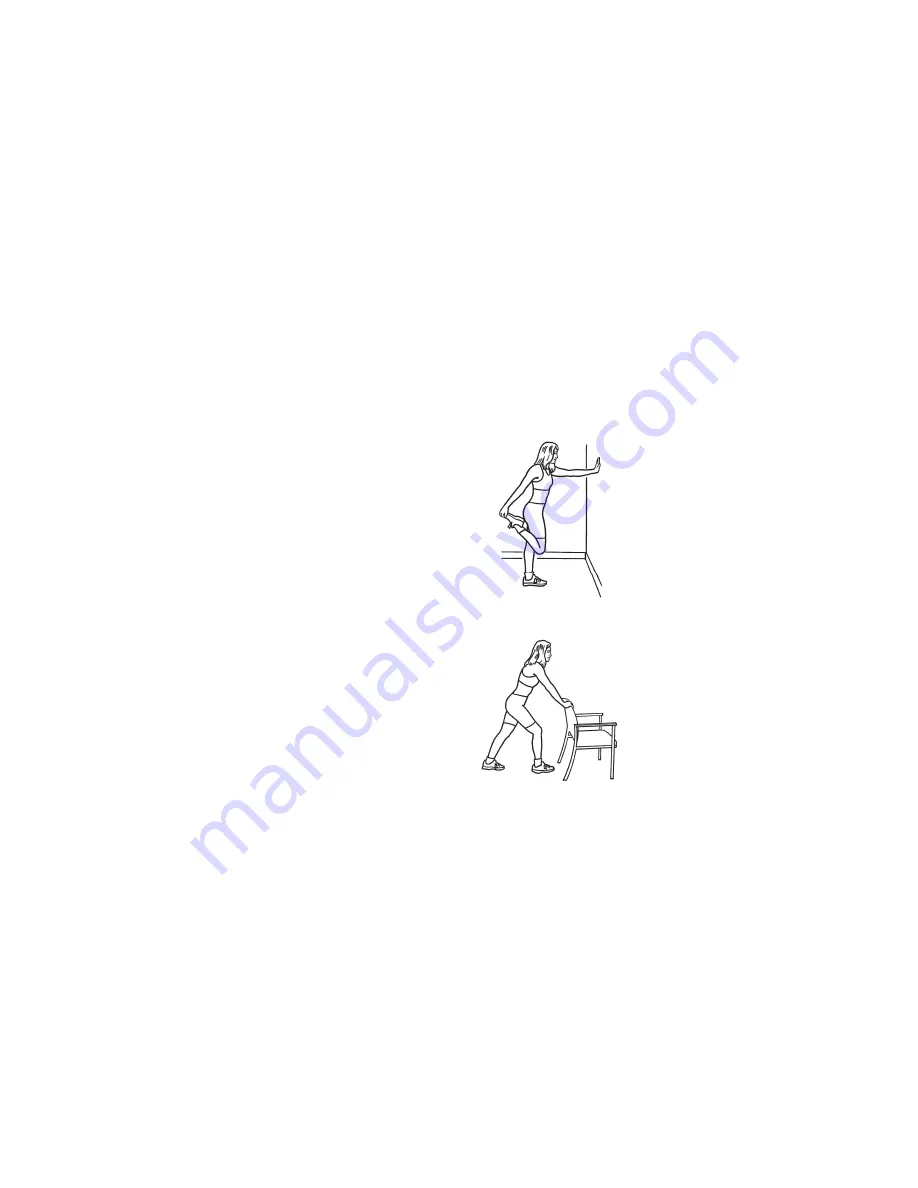
7
Stretches can help improve flexibility and relieve the tightness in muscles that results
from repetitive sport movements that require a limited range of motion, like elliptical
striding. 10 to 12 minutes of daily stretching is recommended. This can be done when
warming up or cooling down. When performing these stretches, your movements
should be slow and smooth, with no bouncing or jerking. Move into the stretch until
you feel a slight tension, not pain, in the muscle and hold the stretch for 20 to 30 sec-
onds. Breathe slowly and rhythmically. Be sure not to hold your breath. Remember
that all stretches must be done for both sides of your body.
W
ARM UP & COOL DOWN STRETCHES
1. Quadriceps Stretch
Stand close to a wall, chair or other solid object. Use
one hand to assist your balance. Bend the opposite
knee and lift your heel towards your buttocks. Reach
back and grasp the top of your foot with the same side
hand. Keeping your inner thighs close together, slowly
pull your foot towards your buttocks until you feel a
gentle stretch in the front of your thigh. You do not
have to touch your buttocks with your heel. Stop pulling
when you feel the stretch. Keep your kneecap pointing
straight down and keep your knees close together.
(Do
not let the lifted knee swing outward.)
Hold the
stretch for 20 to 30 seconds. Repeat for the other leg.
2. Calf and Achilles Stretch
Stand approximately one arms length away from a wall
or chair with your feet hip-width apart. Keeping your
toes pointed forward, move one leg in close to the chair
while extending the other leg behind you. Bending the
leg closest to the chair and keeping the other leg
straight, place your hands on the chair. Keep the heel
of the back leg on the ground and move your hips
forward. Slowly lean forward from the ankle, keeping
your back leg straight until you feel a stretch in your calf
muscles. Hold for 20 to 30 seconds. Repeat for the
opposite leg.
18
Frequency:
3 - 4 times per week
Duration:
20 - 30 minutes
Intensity:
60 - 70% of age predicted maximum heart rate
Stepping speed:
Less than 50 strides per minute
PROGRAM TWO
Intermediate Conditioning Program
In most cases, this program will produce results consistent with the fitness goals
for the majority of the general fitness population.
Exercises:
Do any combinations of all the exercises or simply focus
on the exercises 1 & 2 for the entire exercise period.
Frequency:
3 - 5 times per week
Duration:
20 - 45 minutes
Intensity:
70 - 80% of age predicted maximum heart rate
Stepping Speed:
50 - 60 strides per minute
T
ARGET HEART RATE ZONE
Before starting this or any other exercise program, consult your
physician,
who can assist you in determining the target heart rate zone
appropriate for your age and physical condition. Certain exercise programs or
types of equipment may not be appropriate for all people. This is especially
important for people over the age of 35, pregnant women, or those with
pre-existing health problems or balance impairments.
Monitor your heart rate while you exercise and keep your estimated pulse
rate within your target heart rate zone.
Follow the instructions on page 19
regarding heart rate monitoring and how to determine your appropriate target heart
rate zone. When used properly, the heart rate pulse sensors and display monitor
provide a reasonably accurate estimate of your actual heart rate. This estimate is not
exact and persons with medical conditions and/or a specific need for accurate heart
rate monitoring should not rely on the estimations provided.































